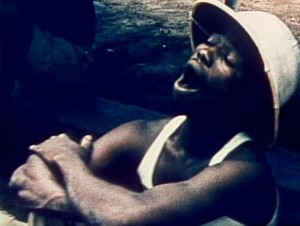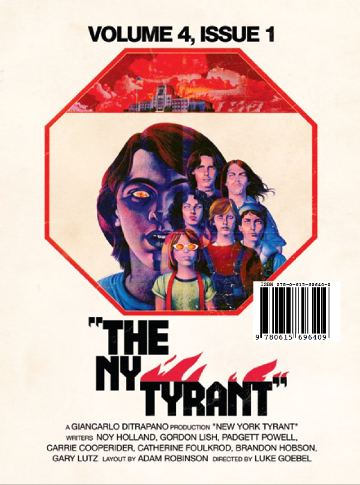I Loved You More by Tom Spanbauer
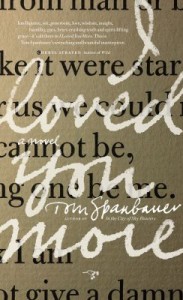 I Loved You More
I Loved You More
by Tom Spanbauer
Hawthorne Books, April 2014
468 pages / $18.95 Buy from Amazon or Hawthorne Books
I Loved You More by Tom Spanbauer starts with a slow burn, like an acid trip, of which there are a few in the book: There’s a preliminary period of seemingly aimless hanging out, and just when you start thinking nothing is going to happen, the room lights up, your heart lurches, and everything begins to glow.
Other writers have tried to quantify the transformation that occurs reading Spanbauer’s writing, the feeling of truth as opposed to artifice, the sense that now we’re really talking. The closest I can come is that it felt like letting air and light into a dark room. The book’s narrator, Ben Gruneberg says it much better, “When you get close to the vein that’s pulsing truth, when you open that vein, you can scrub your soul clean with the blood.”
Spanbauer is known for his truth-telling and open veins. He’s a gay writer and creative-writing teacher in Portland, Oregon, one of the gang of Portland writers of whom Cheryl Strayed and Chuck Palahniuk are the most famous, and Lidia Yuknavitch is the most beloved to me, personally. (Though, I don’t know if all these people are really a gang, or if that’s an outsider’s perception; I’m calling a Portland School, and assuming Spanbauer is a founder.) His Wikipedia entry says that he’s been living with AIDS since the 90s, and his AIDS book, In the City of Shy Hunters is a literary classic.
This latest novel, I Loved You More, published by Hawthorne Press in April 2014, is also a gay coming-of-age story, a living-with-AIDS story, and a story about male friendship, which seems to be mostly autobiographical. In it, Spanbauer’s alter ego, Ben Gruneberg—like Spanbauer, a writer and writing teacher with the same basic points of biography—chronicles his lifelong friendship with a straight male writer, Hank Christian, and the explosive end of that relationship. A bit of Google-digging will reveal a possible candidate for the real-life model of Hank.
On one level, it’s not a particularly dramatic story—a love triangle! featuring three writers! in Portland! and a pot of kale!—and how it all ends is mostly revealed on the first page. Moreover friendship is usually a side-story, not a main event, and devoting a book to the demise of one feels odd. The first section takes place in New York in the late 80s, when Ben and Hank are young writers at Columbia, studying under a fictionalized version of Gordon Lish, and their hanging-out, and the importance Spanbauer imbued it with, took a while to seize hold of me. And then it did.
Part of the alienation and then the magic is Spanbauer’s prose style, which is beatnik-ish in an old-fashioned way, using slang and refrains, a lot of fucking this or fucking that, man. His sentences are unconventional and fragmentary: “That old litany in this strange new place, how it made my heart stop.” Or this description of a leather bar: “In front of us, three men deep. Beyond, the bar is dark. Smoky dark. A foggy night, an ocean of men, dark waves. They have a sound, the waves, here and there bursts of pirate laughter, then no laughter.”
September 26th, 2014 / 10:00 am
“3490 people bought something besides the bestseller” — Talking with Pete Mulvihill of Green Apple Books
 May 3rd is California Bookstore Day, and some bookstores in California have giant worms for mascots. Growing up, that’s where I tried to buy as many of those “code-your-own-adventure” QBASIC books (what were those called?) as possible. Years later, home for Christmas, I bought a first edition copy of Gordon Lish’s Mourners at the Door and tried to convince the bookstore owner to care. “Oh yeah, Lish,” he said. Being as this was California, it wasn’t inconceivable to take an “oh yeah” a certain way, so I asked him: “Did you know him?” And he said “Not if I could help it” and walked away.
May 3rd is California Bookstore Day, and some bookstores in California have giant worms for mascots. Growing up, that’s where I tried to buy as many of those “code-your-own-adventure” QBASIC books (what were those called?) as possible. Years later, home for Christmas, I bought a first edition copy of Gordon Lish’s Mourners at the Door and tried to convince the bookstore owner to care. “Oh yeah, Lish,” he said. Being as this was California, it wasn’t inconceivable to take an “oh yeah” a certain way, so I asked him: “Did you know him?” And he said “Not if I could help it” and walked away.
Other bookstores have coffeeshops above them or below them. Some bookstores are in old firehouses. (Even if they’re not really bookstores). Occasionally, an architectural firm will have an empty storefront, and they will let you put a bookstore in there. Some bookstores are famous, and you have to be quiet going up the stairs to the good room because movie people are asking Lawrence Ferlinghetti about gold-plated avocados. If you’re a new bookstore, it might be beautiful to sell only poetry and run the store with your spouse and your baby. If you’re an old bookstore, Adam Robinson will probably ask you some questions about the kids painting outside. When you’re a mighty bookstore with your own highway attraction sign, you might put another bookstore inside yourself, like Grey Matter Books did with Troubador. Sometimes you will eat a lot of cheese in a bookstore and buy the books that Peter Gizzi tells you to buy, as I have done in Amherst Books. Other times you will be stranded waiting for a ride in some commuter town in New Jersey, so you will spend all your time at a bookstore until it closes, and the owner will get on his motorcycle and kick you out but give you a free Javier Marias novel because he feels bad for you.
Remember when it wasn’t stressful to be in a bookstore? And you weren’t guiltily squaring your desire for the world’s eyes on your own goo with the sheer magnitude of book stuff that already exists? And it just seemed where-am-I-going-to-get-enough-hours-and-light amazing that all these books—in their bound and sentenced way—felt like talking? When I think about California Bookstore Day, I think about giant worms, and I think about that feeling.
 One bookstore instrumental in starting and sustaining bookstore culture in all of Sweet Cali is Green Apple Books in San Francisco. If you live in the Bay Area, or you’ve made stopovers on a regular basis, you probably know Green Apple. They’re down there in the Richmond district, their store is huge and full of good surprises—used books, new books, LPs—and they’ve got that sweet green guy out front. Publishers Weekly recently agreed with the book-buying elbow patches in San Francisco and smartly awarded Green Apple Bookstore of the Year.
One bookstore instrumental in starting and sustaining bookstore culture in all of Sweet Cali is Green Apple Books in San Francisco. If you live in the Bay Area, or you’ve made stopovers on a regular basis, you probably know Green Apple. They’re down there in the Richmond district, their store is huge and full of good surprises—used books, new books, LPs—and they’ve got that sweet green guy out front. Publishers Weekly recently agreed with the book-buying elbow patches in San Francisco and smartly awarded Green Apple Bookstore of the Year.
Green Apple was started in 1967 by a former United Airlines radio technician named Richard Savoy, but now it’s owned by two Kevins—Hunsanger and Ryan—and a Pete: Mulvihill. They are the big dream scheme cookers behind California Bookstore Day, which they want to push to national prominence on par with Record Store Day. They’re active in a ton of San Francisco area stuff—check this lovely listy quote from PW: “founding the San Francisco Locally Owned Merchants Association, participating on the boards of the Northern California Independent Booksellers Association and the Clement Street Merchants Association, and advising Litquake and the San Francisco Library’s One City One Book program”—and sometimes they give you tacos at midnight when Murakami releases a book called 1Q84.
To find out more about what it’s like behind-the-scenes at Green Apple and to shine some hype on Bookstore Day, I asked Green Apple co-owner Pete Mulvihill a few questions, and he was gracious enough to dish some great answers.
Read the interview below the jump!
MFA vs NYC vs WWE
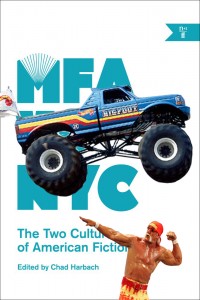 The ring is sparsely decorated: a white mat with pleasant turquoise bands to hold the war in. The crowd’s looking at it. The lights go down. Chad Harbach walks out into the middle of the ring. The crowd goes silent.
The ring is sparsely decorated: a white mat with pleasant turquoise bands to hold the war in. The crowd’s looking at it. The lights go down. Chad Harbach walks out into the middle of the ring. The crowd goes silent.
He clears his throat. Points a rusty revolver at the ceiling. Fires it.
George Saunders crawls under the ropes with a folding chair and unfurls it, sitting down cross-legged in the corner of the ring. Chad Harbach has retreated to the announcer’s table. Meanwhile, Maria Adelmann walks onstage with her hands in her pockets. She looks out idly at the stage-lights, the thousands gathered in the stands. Suddenly Eric Bennett leaps into the ring with a sheaf of paper and clocks Adelmann in the head with it. He stands there, suddenly mournful, looking at what he’s done. George Saunders still sits on his folding chair with his hands in his pockets, looking mildly perplexed.
March 26th, 2014 / 11:00 am
TWOCLOSEWORDS: HAUNTING / HUNTING
(A scene from Les Maîtres Fous (The Mad Masters), a film by Jean Rouch)
Haunting –
My left eye is fucked. It isn’t the first time. I’ve mentioned its swollen episodes everywhere: in poems, on the phone.
Because I think it’s hysterical. Because I really can’t get over it.
LOLOLOLOL. A POET. WITH A SENSITIVE. EYEBALL. FUCK ALL THAT.
Lately, there are tiny, irritated dots that have been piling up in the corner. My roommate gives me clay and DMSO, which is HORSE LINIMENT. She dabs it on for me. The eye’s anger ebbs and flows.
I like that my own body keeps haunting me from this particular room, always from this left eye, trying to get me to deal with or acknowledge some part / stress deposit of myself that I’ve neglected / buried. Your own body interrupts you. It unexpectedly cuts you off. I feel more than slightly disembodied when I look at it in the mirror, when I touch it. Ghosts are red.
Maverick Jetpants in the City of Quality by Bill Peters
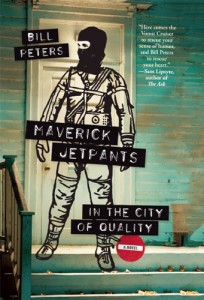 Maverick Jetpants in the City of Quality
Maverick Jetpants in the City of Quality
by Bill Peters
Black Balloon Publishing, October 2012
280 pages / $14 Buy from Amazon or Indiebound
Rebecca Solnit identified two disparate meanings of the word “lost” in her book A Field Guide to Getting Lost: “Losing things is about the familiar falling away, getting lost is about the unfamiliar appearing.” Bill Peters’ first novel, Maverick Jetpants in the City of Quality, does a tremendous job of exploring these two meanings with characters who think and speak with an idiomatic style made up of in-jokes (“Colonel Hellstache,” “Pinning Bow Ties on the Dead,” “Jaeger Cowpunch”) shared between characters that, over the course of the book, competes with the generic language of the Real World.
Peters’ characters ably resist the realities of adult life (until they can’t) and its pre-existing modes of expression, which one character claims have been “made stale or co-opted into oblivion by government agencies,” forcing man to be “incarcerated by his own linguistic detritus.” This helps to explain why, at an earlier point in the novel, that same character makes the following pronouncement: “Your dad was a gelding and your mother was a whale, and they gave birth to a suitcase with a flesh mask inside.”
The arc of Maverick Jetpants’ story will be familiar to readers of contemporary coming-of-age novels: Nate, the book’s narrator, chronicles the unraveling of his best friendship with Necro, an artist caught up in a “business opportunity venture” for “capital – you know – expenditure or whatever” with a dangerous group of neo-Nazis; the differences between his oddball stepdad (Fake Dad No. 3) and biological father (Real Dad); the banal thrill of cruising through a place (Rochester, New York, 1999) you simultaneously curse and celebrate; and the demands and dialect of adulthood.
Peters’ singular style is so good, though, his character’s sentence-shapes and sounds so far from bored or boring, that plot summary seems somewhat beside the point. Nate suffers from what you could call VDD (Vocational Deficit Disorder), and Peters’ voice sometimes resembles what Joshua Cohen recently referred to as E.S.L.: “Ennui as a Second Language, or Emulating Sam Lipsyte, a style that entertains through mortification, and mortifies through . . . you get it.” Even directionally challenged characters with bit parts have voices that want to sing on the page. A character introduced near the end of the book has the following first words: “So let’s go get that drink already […] Pitcher of Get-the-Hell-Outta-Here-Juice.”
As the novel progresses the constituent parts of Nate’s narration mutate from fast-and-furious slang to more serious units of straight-talk. Compare, for example, the following two passages. The first is from a scene early in the book, immediately after an explosion that has injured Nate and Necro’s friend Wicked College John; the second from a scene late in the book, involving their friend Toby:
“Because, I come out here and try to talk to Necro about a Plan. And, now? Necro knee-slides on the pavement to perform CPR on Wicked College John? Like he’s trying to be Tadahito Murakami: Ninja Surgeon and save the world?”
—
“Since I’m calling this evening over, I twirl my keys around my index finger. But suddenly I feel a scrape on my knuckle and my keys are gone, because Toby just yanked my key ring off my finger, hooked the girl’s body with one arm, and opened the driver’s side rear door and slammed it shut. He slaps down all the locks on the windowsills and immediately grabs the girl by her hair and facebombs her on the lips. I hear her gag and try to say something, and Toby’s suctioning her whole face practically, and something creaks in the car, and a handprint smears on the window, and I see Toby’s fist under the back of her shirt, and the girl’s hair mats up against the glass, and Toby almost rolls into the seat well, and the car shakes when he palms the floor….”
September 30th, 2013 / 11:00 am
I Am Sad And Lonely: Notes On Blurbs
The following are my notes for obtaining blurbs, a nearly six-month endeavor, for my novel Daniel Fights a Hurricane. My hope is that this list is a kind of raw/sloppy guide for others reaching out to the same, or similar, authors. Here, maybe, is what to expect.
Which Trial?
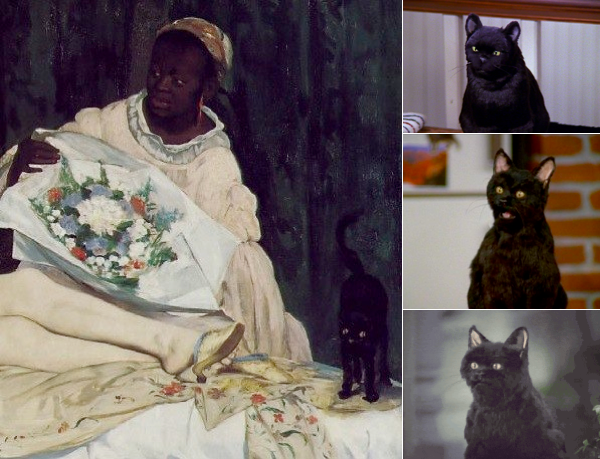
As our eyes get sucked into the flat vortex of Olympia’s pale skin (Olympia. Manet, 1863), we miss the black cat, visually camouflaged in the same manner as the black maid. The cat holds the threatened pose of an arched back, perhaps terrified at the prospect of being immortalized in this human game of representation. In a now timeless interview at a New York Times TimesTalks event, Paula Deen — in that weird Southern defensive and ultimately counteractive way — feels compelled to express solidarity with black folk by casually calling up a black employee, one Hollis Johnson, whose skin she warned was “as black as this board,” referring to the backdrop behind her. “We can’t see you standing in front of that dark board!” she says, which made me, of all people, behind my laptop, feel humiliated. My sensibilities (privileged, protected) were simply shocked. The audience awkwardly laughs, knowing in their bones that just ain’t right, but this was before her public lynching (irony lives on). I’ve never liked Paula Deen; the affected Southern drawl, entitled casualness with everything around her, and earplugs politics all make for a kind of confederate hubris at war with liberal America, which is exactly the demographic (out-of-touch obese Republicans) Food Network was aiming at; and while it remains so predictable, and hypocritical, that they quickly snip her corrupted legacy from their corporate brand, it was invariably the only thing they could do. Instead of using this sad time to talk about racism (if it is even that, or merely glib provincialism), the academics and media have safely mollified discourse by shutting it down, branding her a “racist,” a conversation ending zinger whose ring feels attuned to McCarthy’s “communist,” Bush’s “terrorist,” and the Neo-Conservative “socialist,” words so bloated with ideological complexity they are rendered cacophonous.
blurbing every story in the new New York Tyrant
I wrote a blurb for every story in the new issue of New York Tyrant.
Luke Goebel guest-edited this issue and dedicated it to his brother, who passed away last year. The quality of the writing in here is killer. Sometimes when a journal has so many big names it’s all b-sides. But everybody brought it. Also, most of these pieces contend in some way with the dual burdens of the physical body and family, so the issue as a whole feels like a unified fantasy of escape from a packed boiler room.
Also there is a release party this Friday at KGB Bar in NYC. There will be an open bar from 8-10 PM and no readings.
OK…the blurbs:
“Amber, Freckled” by Cooper Renner
Renner’s terse prose dissolve the notion of the fixed self in a surreal, genderless kitchen. Kill your family.
“Clyde Roy” by Brandon Hobson
Whose body is this? That is the question Clyde Roy and so many of us face. Readers who want out of themselves will identify with this story. Kill your family.
untitled drawing by Atticus Lish
On looseleaf paper, Lish portrays a baby who gives his mother more sexual pleasure than her husband. Kill your husband.
An Interview with Christine Schutt

 Christine Schutt is the author of two short story collections, A Day, A Night, Another Day, Summer and Nightwork. She is also the author of two novels: All Souls, which was a finalist for the 2009 Pulitzer Prize, and Florida, a finalist for the 2004 National Book Award. With Diane Williams, she edits the literary journal NOON. Her new novel, Prosperous Friends, will be published by Grove Press on November 6.
Christine Schutt is the author of two short story collections, A Day, A Night, Another Day, Summer and Nightwork. She is also the author of two novels: All Souls, which was a finalist for the 2009 Pulitzer Prize, and Florida, a finalist for the 2004 National Book Award. With Diane Williams, she edits the literary journal NOON. Her new novel, Prosperous Friends, will be published by Grove Press on November 6.
Michelle Y. Burke is the author of Horse Loquela, winner of the 2007 Red Mountain Review Chapbook Series Award. She lives in Cincinnati.
Burke: One of the things I admire most about your writing is how it sounds. Your sentences are so rich and lyrical. To what extent are you thinking about sound when you’re writing?
Schutt: I do think about sound. What I want to do is wed sound to scene. What comes first is a picture. READ MORE >
New York Tyrant Vol. IV Num. I
Better get this now; they always sell out fast and this will be no exception. One of the few magazines I still read cover to cover, maybe the only one. This issue is special-edited by Luke Goebel.
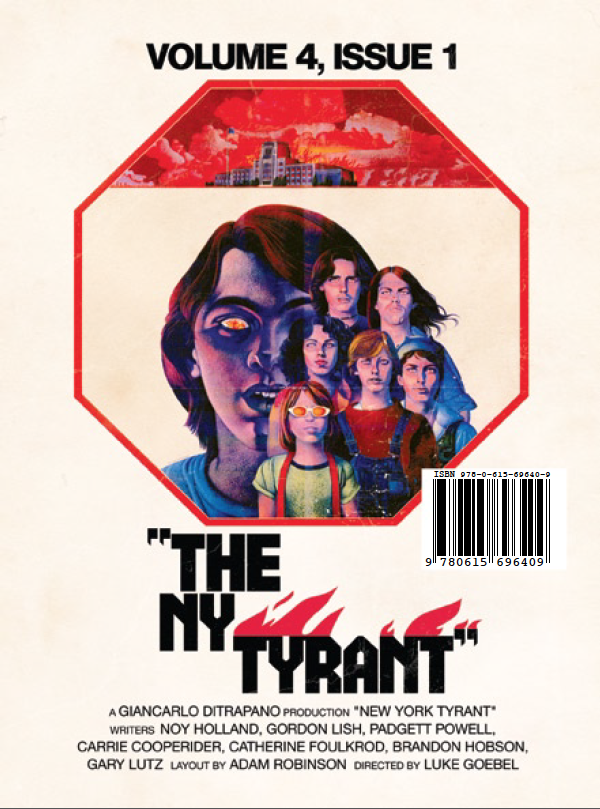
PAULA BOMER, HOB BROUN, CARRIE COOPERIDER, PUEHLE DIEBSONOVICH, CATHERINE FOULKROD, SUSAN FRODERBERG, RACHEL B. GLASER, BRANDON HOBSON, NOY HOLLAND, MARK LEIDNER, TAO LIN, GORDON LISH, ROBERT LOPEZ, GARY LUTZ, DAVID McLENDON, PADGETT POWELL, COOPER RENNER, PAMELA RYDER, AMBER SPARKS, JOSIAH SUMMERVILLE, J.A. TYLER, SAM VIRZI, ZACK WENTZ, COREY ZELLER.

